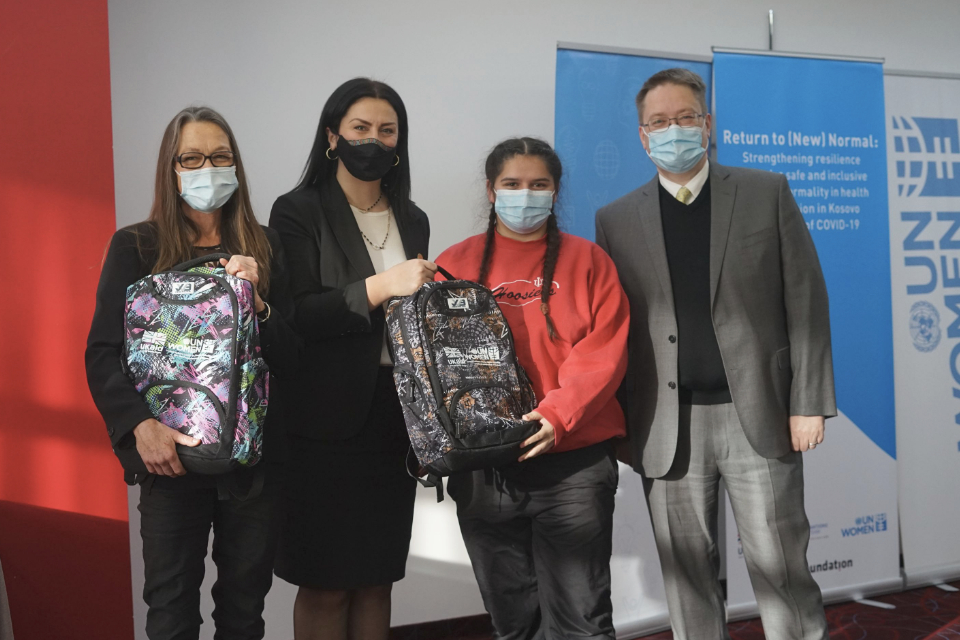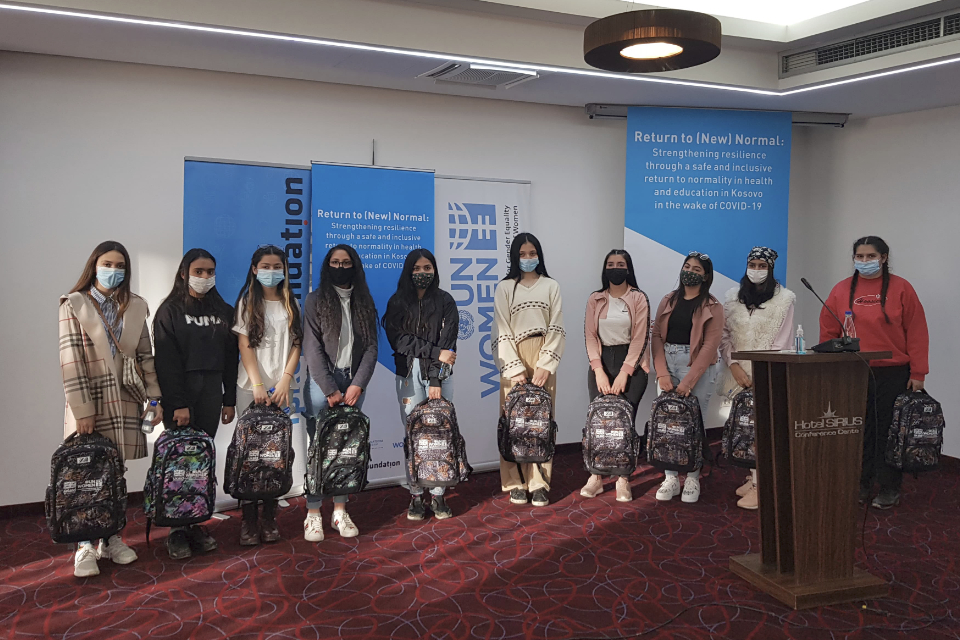UN Women and the British Embassy in Kosovo intensify efforts to reduce pandemic-related school dropouts of young women and girls
UN Women and the British Embassy have distributed 190 laptops to young women and girls from Roma, Ashkali and Egyptian communities to facilitate their online learning and prevent school dropouts.Date:

School closures caused by the COVID-19 pandemic have had a greater impact on young women and girls who had to take responsibility for domestic work and care of the elderly. To tackle this, UN Women is applying an intersectional approach to reach those left furthest behind, including young women and girls from marginalized communities and those with disabilities.
The vulnerable situation of young women and girls from the Roma, Ashkali and Egyptian communities has been further exacerbated by the COVID-19 pandemic. Most young women from these communities do not own Information Technology equipment or have access to the internet and are thus excluded from the new online education system. Coupled with increased domestic and care duties at home, young women and girls are at risk of losing their academic year and to ultimately drop out of school. A rapid assessment conducted in Kosovo[1] in May 2020 by UN Women, UNDP, UNFPA and UNKT found that the pandemic has exacerbated the burden of women and girls’ unpaid care work, hindering and limiting their professional and educational lives.
On 22 February, an event organized by UN Women and IPKO Foundation, supported by the British Embassy in Kosovo kicked off the laptop distribution to young women and girls in these communities. During the event, British Ambassador Nicholas Abbott stated: “Girls’ education is central to this project. Together with UN Women and the UN Kosovo team, today I am happy to support girls with laptops in order to facilitate their access to education. I hope you enjoy these laptops and use them to learn and expand your knowledge. You are the future of Kosovo and we will not stop championing our efforts for your fundamental right, education.”

Opening remarks were also held by Ulrika Richardson, United Nations Development Coordinator in Kosovo who stated: “As a result of the pandemic, women and girls are spending more time now with chores at home, cooking and caring for the elderly and other family members. This also means that many girls, particularly from disadvantaged households are missing out on education. They do not have the time nor can they access online and distance learning. Thanks to the UK and with this IT equipment and training, we want to work with girls and young women, particularly from marginalized communities, and send a clear message to decision-makers that more must be done to ensure that all girls and young women have access to quality education and other social services irrespective of ethnic group or income level. Leaving no one behind must be the motto going forward as we build back better!”
Vlora Tuzi Nushi, UN Women Head of Office stated: “Even before the pandemic, girls from non-majority communities, and those living in poverty had low school attendance rates, whilst now, due to the pandemic, young women and girls in Kosovo have been disproportionately burdened with care work in the household, and an increased occurrence of gender-based violence. Together with our partners and
supported by the British Embassy, we are working to ensure that young women and girls from most marginalized groups have equal access to education and are not left behind as we respond to COVID-19.”
A total of 190 laptops were distributed to young women from Roma, Ashkali and Egyptian communities in February and March to prevent their school drop-out. These young women and girls will also follow career trainings, and on basic IT skills. "Thanks to the laptop provided by UN Women, I can finally access online learning. I am really thankful," said Rabie Berisha, one of the young women who received a laptop. Senada Gashi, who also received a laptop said, “The laptop from UN Women will facilitate my learning during the pandemic and make everything much easier for me.”
The initiative is part of the project “Return to (New) Normal in Kosovo: Strengthening resilience through a safe and inclusive return to normality in health and education in the wake of COVID-19” which is implemented by UN Women, UNFPA, UNICEF, and the World Health Organization.
[1] All references to Kosovo should be understood to be in the context of United Nations Security Council resolution 1244 (1999).